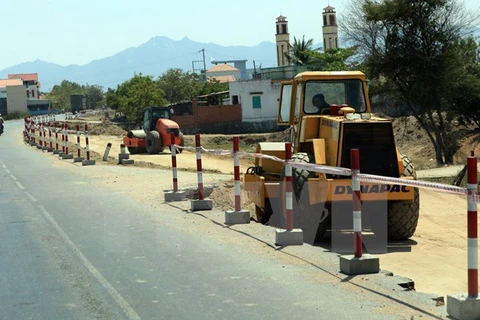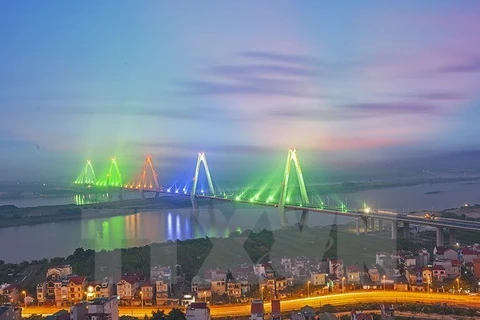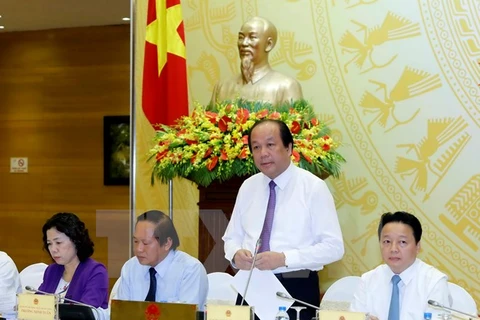 Workers carry out construction work on Tan Vu-Lach Huyen Road in northern Hai Phong City (Source: VNA)
Workers carry out construction work on Tan Vu-Lach Huyen Road in northern Hai Phong City (Source: VNA) Hanoi (VNA) - Enterprises in the transport sector have become more eligible for official development assistance (ODA) after being restructured, officials say.
Many international organisations, including the World Bank (WB), Asian Development Bank (ADB) and Japan International Cooperation Agency (JICA), alongside sponsors from France, the Republic of Korea and China, have been funding traffic infrastructure projects in Vietnam.
However, strict requirements by the sponsors, related to financial capacity and experience, left hardly any chance for the participation of State-run companies in ODA-funded projects in the past.
For example, the WB did not let State utility companies bid for its projects, enabling only foreign companies to become its major contractors.
According to Nguyen Duc Kien, General Director of the infrastructure development Thang Long Corporation, "domestic companies usually had to work as sub-contractors for foreign firms, being put at many disadvantages."
The situation is different now.
Vu Anh Minh, Director of the Ministry of Transport's Enterprise Development Department, said numerous firms have been equitised and State capital has been withdrawn from many other businesses in the sector over the past two years.
With the reorganisation, they are now capable enough to contract for major projects with ODA capital, either independently or jointly with international contractors, he said.
Minh said earlier this year that the ministry would accelerate equitisation of transport corporations. It planned to complete capital withdrawal from several firms, including Cienco 5, Cienco 6 and Cienco 8 in 2016.
"The sooner enterprises get off ‘their parents' nourishment', the more experience and resources they will gain to better adapt to market developments," he said. "This is especially meaningful when we are integrated more deeply into the global economy."
Between 2011 and 2015, 137 businesses in the transport sector went public, 67 more than the target that the ministry set for the period, according to the ministry's data.
Vietnam Expressway Corporation General Director Mai Tuan Anh said any domestic enterprises could now participate in ODA-funded projects of his company provided they prove adequate financial capability and experience.
The company strictly selected contractors using international competitive bidding procedures, he said.
According to Anh, JICA financed a part of the Da Nang-Quang Ngai highway in the centre of the country, with Vietnamese enterprises executing seven of eight construction packages, while a joint venture between Viet Nam and Spain was responsible for the rest of this part.
With regard to three packages funded by JICA in the Ben Luc-Long Thanh highway project in the south, Vietnamese and Japanese enterprises jointly became contractors.
Nguyen Tuan Huynh, Chairman of Civil Engineering Construction Corporation No 4 (Cienco 4), said the State-run firm transformation into a joint stock company in mid-2014 was a landmark for its development.
This created better conditions for it to expand markets and approach large-scale projects funded by WB, ADB and JICA. Two of the projects were the Noi Bai-Lao Cai highway in the north and the Nhat Tan bridge in Hanoi.
Huynh said Cienco 4 was actively renewing management methods, rationalising organisational structure and enhancing operational efficiency. It now would focus on improving technology, financial capacity and human resource quality to stay competitive for ODA project requirements.
Kien from Thang Long Corporation said his firm would promote cooperation with foreign contractors to better respond to opportunities of ODA projects.
According to the public-private partnership project management board under the transport ministry, it is important to develop cadres for equitised businesses. Besides capital and equipment, human resources are reportedly of the most decisive factors in determining tender winners.-VNA























